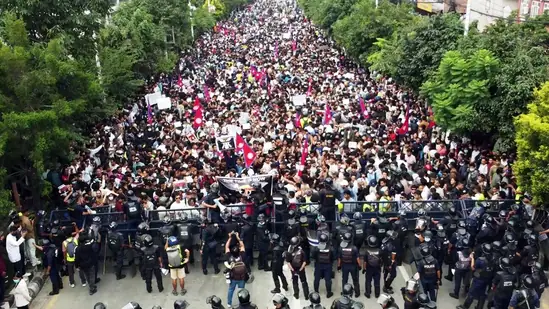Ex-PM Sher Bahadur Deuba and His Wife Assaulted Amid Rising Public Dissent
In a chaotic scene in the heart of Kathmandu, former Nepal Prime Minister Sher Bahadur Deuba and his wife, Arzu Rana Deuba, who serves as the foreign minister, found themselves at the center of escalating anti-corruption protests that have gripped the nation. The couple was violently assaulted by enraged demonstrators, who stormed their residence in Budanilkantha, marking an unprecedented turn in the protests that have continued for two days. Images circulating on social media depict Deuba bleeding from his face, sitting helplessly in the aftermath as onlookers captured the distressing scene.
The protests erupted on Friday, fueled by widespread anger over corruption allegations and the government’s decision to implement a nationwide ban on social media platforms. Activists, led largely by the youth known as ‘Gen Z’ demonstrators, are demanding accountability from government officials amidst claims of rampant corruption that have persisted for years. The unrest has taken a deadly turn, with reports indicating that the violence has left at least 19 individuals dead and over 300 injured, raising concerns about public safety and government responsiveness.
Protests Escalate: A Nation Confronts Corruption
The catalyst for these protests was an official ban on various social media platforms, which was swiftly perceived as an infringement on free speech and a tactical maneuver to quell public dissent. This draconian action prompted an immediate reaction from the populace, leading to the widespread demonstrations that spiraled into chaos. Protesters vandalized residences of political leaders, set ablaze party offices, and clashed with police forces, indicating a significant shift in the public’s tolerance for corruption and governmental overreach.
During these tumultuous protests, visuals reminiscent of war zones emerged from Kathmandu, showcasing young people engaging in fierce confrontations with law enforcement personnel. Agitated voices echoed through the streets, demanding the immediate resignation of current Prime Minister KP Sharma Oli, while shouting slogans like, “KP Chor, Desh Chodd” (translated as “KP thief, leave the country”).
As the situation intensified, it became increasingly apparent that the actions of the government were not merely dismissed. The Prime Minister, recognizing the unprecedented level of public outrage, rescinded the social media ban and announced his resignation during a press conference on Tuesday. This decision, however, came too late for many, as the protests had already left a significant mark on the political landscape of the nation.
Violence and Resistance: The Youth Take a Stand
The protests, characterized by their ferocity and determination, have become a battleground for the nation’s youth, who have mobilized in unprecedented ways to confront the establishment. Reports indicate that Finance Minister Bishnu Prasad Paudel was physically chased through the streets by protestors, further demonstrating the high stakes of the current unrest. A young protester infamously jumped and kicked the minister, sending him crashing into a wall and symbolizing the growing frustration toward leaders viewed as corrupt and unresponsive.
Social media platforms, including Facebook, YouTube, and X, were initially blocked as part of the government’s strategy to suppress dissent. This action proved counterproductive, igniting further protests that called for an end to the ban. “Stop the ban on social media. Stop corruption, not social media,” protesters shouted, revealing the public’s insistence on transparency and accountability from their leaders.
As tensions rise, the streets of Kathmandu have become filled with slogans and cries for action against corrupt leaders. Those participating in the protests are not only demanding immediate changes but are also vocalizing the frustrations of an entire generation that feels disenfranchised and disillusioned by the political status quo.
A New Era of Political Engagement in Nepal
The violent protests serve as a reminder that the people of Nepal are unwilling to remain passive in the face of systemic corruption. The events surrounding the assault on Sher Bahadur Deuba and his wife signify a critical juncture in the nation’s political climate. The moral compass of the protests has drawn a line in the sand, with many young Nepalis declaring that they will no longer accept the status quo.
As the aftermath of the protests continues to unfold, the implications of this unrest will undoubtedly reverberate throughout Nepal’s political landscape. The youth-driven outcries could help usher in a new era of political engagement, with citizens demanding their voices be heard and their rights protected.
In the coming weeks, observers will be closely watching how the government responds to this movement and what steps, if any, will be taken to address the root causes of public discontent. Political analysts and experts suggest that the future of governance in Nepal may hang in the balance, as the population becomes increasingly engaged and aware of their political agency.
For further reading on the consequences of governmental censorship, check out[The Guardian](https://www.theguardian.com/world) and[Al Jazeera](https://www.aljazeera.com) for international perspectives on similar movements globally.
The Fight Against Corruption Continues
In the face of adversity, the fight against corruption in Nepal is far from over. As the nation grapples with its political future, the resilience and determination displayed by the protestors serve as a powerful reminder of the role of civic engagement in shaping governance. The actions taken by individuals who dare to stand up against corruption will play a crucial role in determining the trajectory of the country’s democracy. The unfolding story remains a testament to the power of collective action, as citizens reclaim their agency and demand accountability from those in power.


